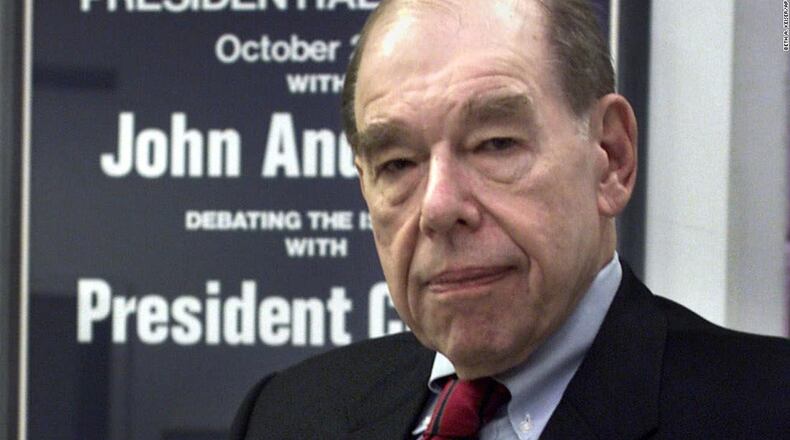Reese Schonfeld, the first president of CNN four decades ago, has passed.
A longtime TV executive, Schonfeld died from complications of Alzheimer’s disease Tuesday in Manhattan, according to his daughter Juliette Schonfeld Reverand. He was 88.
“There might not be a CNN today if Ted Turner had not recruited Reese Schonfeld as its founding president. He was a brilliant, very creative executive,” said Tom Johnson, president of CNN from 1990 to 2001.
With the growth in satellites in the early 1970s, Schonfeld pondered the idea of 24/7 news long before Turner came up with the idea.
At the time, Rick Brown worked at Schonfeld’s the Independent Television News Association in the 1970s, which provided news packages to independent TV stations before joining Schonfeld in Atlanta to launch CNN. He recalled seeing paperwork on Schonfeld’s desk at ITNA exploring the very idea that CNN would become.
When Schonfeld heard Turner’s interest in using satellite space to launch a second cable network focused on news to complement his broad entertainment channel TBS, they decided to team up. Turner was not a news junkie but saw the potential value of such a news network. Early on, Schonfeld’s passion for the idea made him the right man for Turner to hire as his first CNN president in 1979.
“Reese assembled people who were just like him: desperate to make this work,” said Lisa Napoli, who recently wrote a book about the launch of CNN called “Up All Night: Ted Turner, CNN and the Birth of 24-Hour News.” “Nobody had done this before. Nobody wanted to fail.”
Schonfeld hired respected newsmen such as former CBS News correspondent Daniel Schorr and war specialist Peter Arnett. He brought a sheen of respectability to the ramshackle operation in Midtown Atlanta, far from the news hubs of New York City or Washington D.C.
Turner and Schonfeld, in effect, needed each other for a period of time. Both understood the power of satellites to spread information worldwide in an instant, something that people take for granted today but was an innovation four decades ago. Shonfeld insured the network was able to launch June 1, 1980, while Turner provided the marketing guile and upfront investment capital.
“Reese needed a guy crazy enough to put himself on the line, and that was Ted,” Napoli said.
Brown, who oversaw satellite feeds in CNN’s early days, said he respected Shonfeld’s dedication as a newsman, if not always his gruffness. “He was a tough boss,” he said, “but he was willing to spend Ted’s money. If there was a big story, Reese made sure we got it no matter how much it cost.”
Ted Kavanau, a producer when CNN launched who later helped start CNN2 (eventually CNN Headline News and now HLN), admired Shonfeld’s pugnacious spirit. “He fought the broadcast networks,” he said. “He fought to get CNN in the White House pool. He was never afraid. And he wasn’t just a news guy. He had a real grasp of the totality. He knew all the nooks and crannies of the business.”
Turner and Shonfeld were equally stubborn and clashed often, especially over personnel issues. In the end, Shonfeld only lasted two years, but he helped keep the news ship afloat during those difficult early years.
“If I had been working for anyone else, given the Nielsen ratings, I would’ve expected a moment of congratulations, shared glory, but Ted Turner did not like to share glory,” Schonfeld wrote in his 2001 memoir, “Me and Ted Against the World: The Unauthorized Story of the Founding of CNN.”
As Napoli said, “It was Ted’s money, not Reese’s, even if Reese felt like it was his baby, too.”
Schonfeld later helped launch News 12 on Long Island, New York, the first all-news local cable channel in the United States. He later was an integral part of starting the Food Network in the early 1990s.
Born in 1931, Schonfeld was a Dartmouth College graduate who later received a law degree from Columbia University. He never practiced law, jumping into news, eventually becoming vice president of United Press International Television News.
The New York Times contributed to this story.
About the Author
Keep Reading
The Latest
Featured




